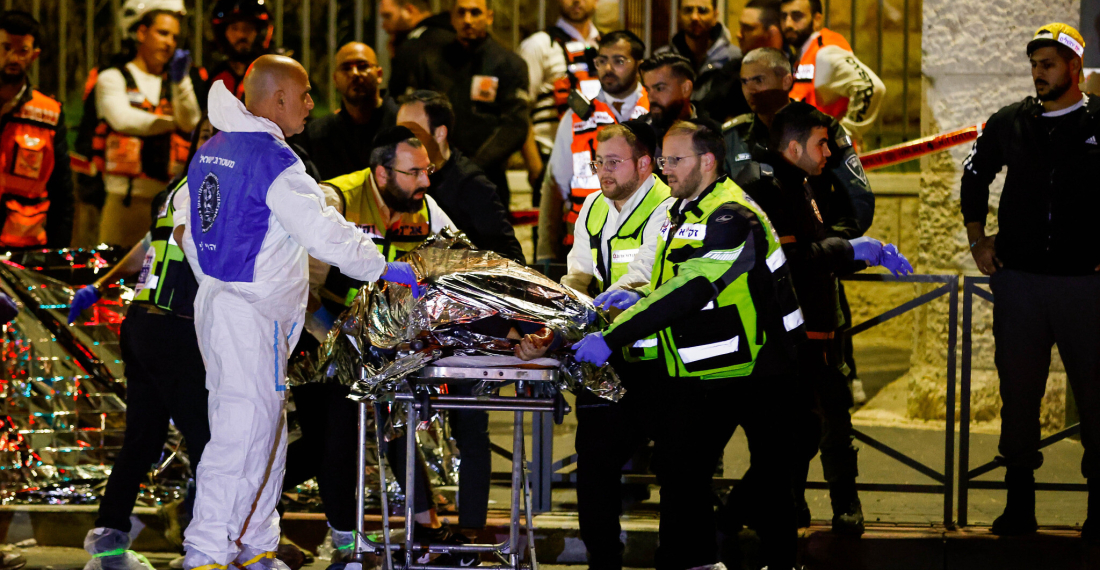Violence in Jerusalem, in Israel and in the Palestinian territories over the last days has shaken the fragile peace in the Holy Land once more, despite calls for restraint by the international community.
On Saturday (28 January), an assailant shot and wounded two people in east Jerusalem, Israeli medics said, hours after a Palestinian gunman killed seven outside a synagogue in one of the deadliest such attacks in years.
Police said the suspect was “neutralized” following the latest gun attack in the Silwan neighborhood, just outside Jerusalem’s old, walled city. Israel’s Magen David Adom emergency response service identified the victims as two men, aged 47 and 23, both with “gunshot wounds to their upper body.” It did not identify those involved.
Prime Minister Benjamin Netanyahu said on Saturday that Israel's response to an attack by a Palestinian gunman attack that killed seven people on the outskirts of Jerusalem will be "strong, swift and precise" .
The mass shooting unfolded as a 21-year-old resident of Israeli-annexed east Jerusalem drove up to the synagogue in the Neve Yaakov neighborhood and opened fire during the Jewish Sabbath.
The bloodshed, which unfolded on International Holocaust Remembrance Day, marked another dramatic escalation in the Israeli-Palestinian conflict.
It came a day after one of the deadliest army raids in the occupied West Bank in roughly two decades, as well as rocket fire from militants in the Gaza Strip and Israeli retaliatory air strikes.
There have widespread calls to de-escalate the spiralling violence, but tensions are rising. Crowds shouted “Death to Arabs” as Netanyahu toured the scene of the synagogue attack late Friday. Palestinians also held spontaneous rallies to celebrate the killings, in Gaza and across the West Bank, including in Ramallah where large crowds swarmed the streets chanting and waving Palestinian flags.
Several Arab nations that have ties with Israel-- including Egypt, Jordan and the United Arab Emirates — condemned the synagogue shooting.
The Lebanese group Hezbollah, one of Israel’s most prominent foes, praised the attack as “heroic,” voicing “absolute support for all the steps taken by the Palestinian resistance factions.”
The gunman at the synagogue was shot dead by police during a shootout that followed a brief car chase after the attack.
There has been no indication that he had prior involvement in militant activity or was a member of an established Palestinian armed group.
Israel annexed east Jerusalem following the 1967 Six-Day War. Palestinians claim the area as the capital of their future state.
Israel’s police chief Kobi Shabtai called the shooting “one of the worst attacks (Israel) has encountered in recent years.”
Nine people had been killed Thursday in what Israel described as a “counter-terrorism” operation in the Jenin refugee camp. It was one of the deadliest Israeli army raids in the occupied West Bank since the second intifada, or Palestinian uprising, of 2000 to 2005.
Israel said Islamic Jihad operatives were the target. Islamic Jihad and Hamas both vowed to retaliate, later firing several rockets at Israeli territory. Most of the rockets were intercepted by Israeli air defenses. The military responded with strikes on Hamas targets in Gaza. There were no injuries reported on either side, but Gaza’s armed groups vowed further action.
After the synagogue shooting, Hamas spokesman Hazem Qassem said the attack proved “the resistance knows how to find the appropriate response” to Israeli “crimes.”
Washington had announced Thursday that US Secretary of State Antony Blinken would travel next week to Israel and the Palestinian territories, where he would push for an “end to the cycle of violence.”
A US State Department spokesman confirmed on Friday that the visit would go ahead and said Blinken would discuss “steps to be taken to de-escalate tensions.”
At least 26 Israelis and 200 Palestinians were killed across Israel and the Palestinian territories in 2022, the majority in the West Bank, according to an AFP tally from official sources.






